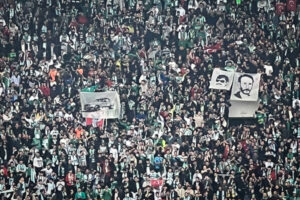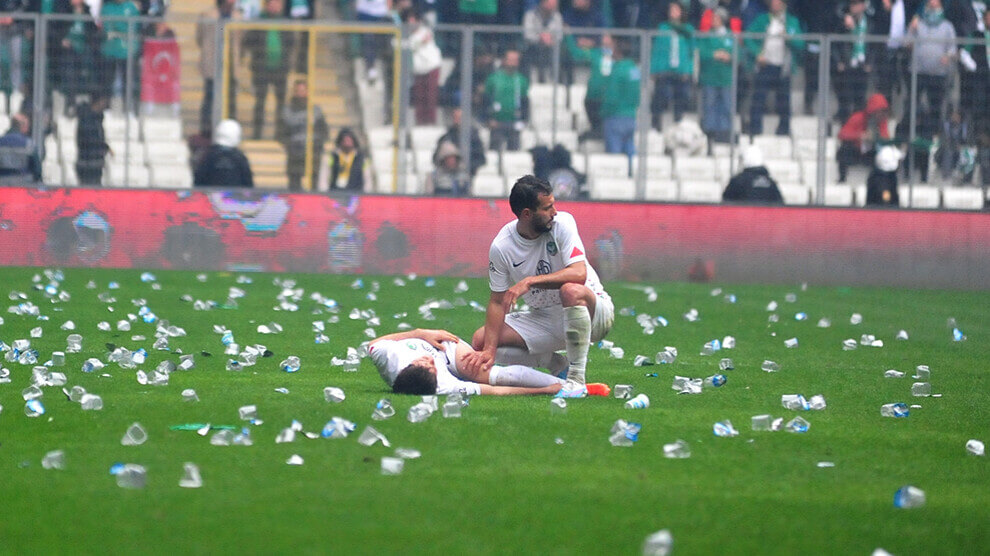A football team from a predominantly Kurdish city was subjected to physical and verbal harassment during a match in Turkey’s west on Sunday evening, raising concerns about increasing tension between the country’s Turks and Kurds, media outlets reported.
Football fans who sat in front of their televisions on Sunday evening to watch a game between Bursaspor in western Turkey and Amedspor, from Diyarbakır, witnessed violence and the chanting of anti-Kurdish slogans against Amedspor, with tensions always running high during matches between the two clubs.
Not only Bursaspor fans but also the team’s players and personnel were involved in the physical and verbal attacks on the players and fans of Amedspor before and after the match in Bursa.
Media reports claimed Bursaspor fans threw a variety of objects including knives, bullets and water bottles onto the pitch before the match began, while chanting racist slogans against Kurds.
The Amedspor Instagram account went live, showing the moment Bursaspor’s players stormed the pitch before the game, starting a fight with their opponents. The account later posted footage of the brawl, calling the incident an “attack” on their team by the Bursaspor players.
Amedspor’s goalkeeper, who is actually a Turk, was slightly injured when hit by one of the objects thrown by Bursaspor fans onto the field.
Maç sonunda soyunma odası koridorlarında Bursaspor Özel Güvenlik Amiri, Kulüp Güvenlik Sorumlusu, kulüp personelleri ve emniyet görevlileri tarafından futbolcularımıza fiziki saldırı gerçekleşti.
Saldırı anlarından kayıt alınabilen görüntüler. pic.twitter.com/BBeGqwQEuK
— Amedspor Kulübü (@amedskofficial) March 5, 2023
In a move that attracted widespread criticism and condemnation, some Bursaspor fans waved controversial banners and posters during the match representing the extrajudicial killings and abductions that had taken place in Turkey’s southeast during the 1990s, at the height of the Turkish-Kurdish conflict.

On some of the posters was a white Toros car used in the 1990s by the Gendarmerie Intelligence and Anti-Terrorist Units (JİTEM) to abduct people they later killed.
Others held up posters of Mahmut Yıldırım, known by his code name “Yeşil” [Green]. Yıldırım, a sinister character in Turkey’s recent history, was a contract killer used by JİTEM in various operations, before he disappeared in 1998.
Interior Minister Süleyman Soylu slammed the violence during Sunday’s match on Twitter, saying that an investigation had been launched into the officials who allowed the controversial posters into the stadium and that some police officers who did not take any action against them had been suspended.
Bursaspor fans began their attacks on Amedspor on Saturday night near the hotel where the Amedspor players were staying, shouting anti-Kurdish slogans and throwing fireworks. “How happy is he who says ‘I am a Turk’” some Bursaspor fans changed, a phrase used by Mustafa Kemal Atatürk, the founder of modern Turkey, and on some occasions used as a slogan to insult Kurds.
Despite the violence, the match was not cancelled, and Bursaspor won 2-1.
The Birgün daily reported on Monday that at least 10 people have been detained in connection to the incidents taking place at Sunday’s match in Bursa.
Meanwhile, the Amedspor players were welcomed by hundreds of people upon their arrival in Diyarbakır on Monday. It was one of the 11 provinces hit by two powerful earthquakes last month that claimed the lives of more than 45,000 people in Turkey’s south and southeast.
The racist attacks against the Amedspor players in Bursa and the posters that revived the painful memories of many Kurds attracted widespread condemnation from opposition politicians, activists and journalists.
The critics accused the authorities of allowing the violence to continue despite the fact that the lives of the Amedspor players were at risk and of failing to take any action against the Bursaspor fans.
Amedspor changed its name in 2014 from Diyarbakırspor to Amedspor, as Amed refers to Diyarbakır in Kurdish. The football team has since then faced several racist attacks during its away games by fans of other football clubs, especially those in Bursaspor, accusing them of supporting the outlawed Kurdistan Workers’ Party (PKK), listed as a terrorist organization by Turkey and much of the international community.
It is common for Kurds in Turkey to face racist attacks and accusations of links to the PKK, which has been waging a bloody war in the country’s southeast since 1984.

